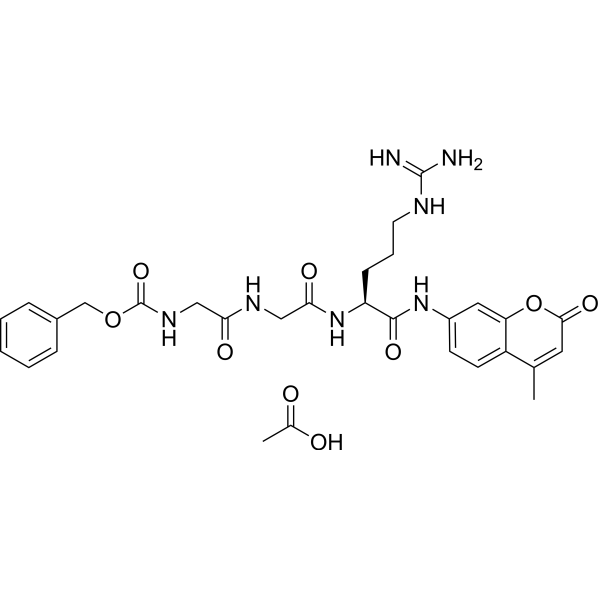
Z-Gly-Gly-Arg-AMC acetate
CAS No. 2070009-61-7
Z-Gly-Gly-Arg-AMC acetate( —— )
Catalog No. M29997 CAS No. 2070009-61-7
Z-Gly-Gly-Arg-AMC acetate is a thrombase-specific fluorescent matrix for the detection of thrombin production in PRP and poor platelet plasma (PPP).
Purity : >98% (HPLC)
 COA
COA
 Datasheet
Datasheet
 HNMR
HNMR
 HPLC
HPLC
 MSDS
MSDS
 Handing Instructions
Handing Instructions
| Size | Price / USD | Stock | Quantity |
| 5MG | 85 | Get Quote |


|
| 10MG | 122 | Get Quote |


|
| 50MG | 356 | Get Quote |


|
| 100MG | Get Quote | Get Quote |


|
| 200MG | Get Quote | Get Quote |


|
| 500MG | Get Quote | Get Quote |


|
Biological Information
-
Product NameZ-Gly-Gly-Arg-AMC acetate
-
NoteResearch use only, not for human use.
-
Brief DescriptionZ-Gly-Gly-Arg-AMC acetate is a thrombase-specific fluorescent matrix for the detection of thrombin production in PRP and poor platelet plasma (PPP).
-
DescriptionZ-Gly-Gly-Arg-AMC acetate is a thrombase-specific fluorescent matrix for the detection of thrombin production in PRP and poor platelet plasma (PPP).
-
In Vitro——
-
In Vivo——
-
Synonyms——
-
PathwayOthers
-
TargetOther Targets
-
Recptor——
-
Research Area——
-
Indication——
Chemical Information
-
CAS Number2070009-61-7
-
Formula Weight639.66
-
Molecular FormulaC30H37N7O9
-
Purity>98% (HPLC)
-
SolubilityH2O : ≥ 60 mg/mL (93.80 mM)
-
SMILES——
-
Chemical NameSequence:Z-Gly-Gly-Arg-AMC
Shipping & Storage Information
-
Storage(-20℃)
-
ShippingWith Ice Pack
-
Stability≥ 2 years
Reference
Tarandovskiy ID, et al. Antiplatelet agents can promote two-peaked thrombin generation in platelet rich plasma: mechanism and possible applications. PLoS One. 2013;8(2):e55688.
molnova catalog



related products
-
Hellebrigenin
Hellebrigenin has anti-hepatoma activities, it induces cell cycle arrest and apoptosis in human hepatocellular carcinoma HepG2 cells through inhibition of Akt.
-
4-Methoxyglucobrassi...
4-Methoxyglucobrassicin is a natural product for research related to life sciences.
-
Propargyl-C1-NHS est...
Propargyl-C1-NHS ester is a nonclaevable linker for antibody-drug-conjugation (ADC).



 Cart
Cart
 sales@molnova.com
sales@molnova.com


